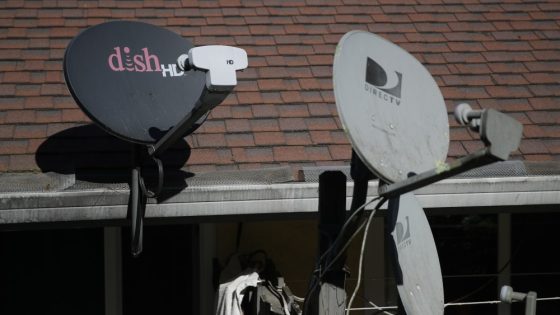As the pay-TV sector continues its downward spiral, DirecTV and Dish Network — two longtime rivals that have explored joining up at various times for years — may be headed to the altar.
DirecTV is in talks with EchoStar, Dish’s parent company, to acquire Dish and Sling TV, according to reports by Bloomberg, the Wall Street Journal and CNBC. A deal could be finalized as early as Monday, Sept. 30, per the reports.
Reps for DirecTV and Dish didn’t respond to requests for comment.
The deal is being driven by EchoStar CEO Charlie Ergen’s desire to pay off $1.98 billion of debt that matures in November 2024, CNBC reported. The company’s debt load has raised the specter of EchoStar seeking a bankruptcy reorganization if it can’t raise new capital or refinance the debt.
DirecTV launched in 1994 and Dish followed in 1996, and the two satellite TV companies provided robust competition to incumbent cable TV operators. But in the past decade, both have seen their subscribers rolls shrink by the millions (as has traditional cable TV) with the rise of streaming prompting a consumer exodus from the sector. DirecTV and Dish have launched internet-delivered pay-TV packages, but those have not offset losses on the satellite side.
Together, DirecTV and Dish have nearly 20 million customers, which is down roughly half from their peak levels. DirecTV service had an estimated 11.3 million subscribers (inclusive of AT&T U-verse TV) as of the end of 2023, according to estimates from Leichtman Research Group, compared with a peak of 25.5 million at the end of 2016. Dish, which once had more than 14 million customers, ended the second quarter of 2024 with 8.07 million pay-TV subscribers (including 6.07 million for Dish TV and 2 million for Sling TV).
Past overtures between DirecTV and Dish, dating back to 2001, have faced regulatory hurdles. But today, “It’s hard to imagine that regulators would block a deal,” MoffettNathanson principal analyst Craig Moffett wrote in a note to clients last week. “Better to have one [satellite TV operator] than none.”
AT&T, which bought DirecTV in 2014, three years ago spun off the satellite TV operator, retaining a 70% stake and private-equity firm TPG Capital holding the remaining 30%.
Two years ago, DirecTV suffered a blow when it lost its exclusive deal with the NFL for the Sunday Ticket premium games package, which it had offered since 1994. Google inked a seven-year deal with the NFL to sell the package via YouTube, starting with the 2023-24 season; currently, Sunday Ticket includes all out-of-market Sunday regular-season NFL games that are broadcast on Fox and CBS.
Moffett noted that the synergies between DirecTV and Dish would “likely be much more limited than you might imagine.” For example, the two companies have no synergies in the satellite fleet because they use different conditional access (video scrambling) technology. “It’s hard to argue that a merger shouldn’t happen; it clearly should,” Moffett wrote. “Consolidation during a period of secular decline is always to be expected. But it would be a mistake to overestimate its importance. Adding a year or so to the expected life of satellite TV isn’t going to change the narrative for programmers, distributors, or even for satellite TV.”
Source Agencies



